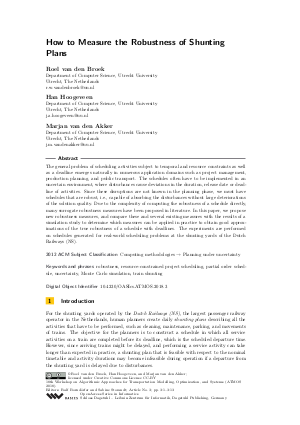How to Measure the Robustness of Shunting Plans
Authors Roel van den Broek, Han Hoogeveen, Marjan van den Akker
-
Part of:
Volume:
18th Workshop on Algorithmic Approaches for Transportation Modelling, Optimization, and Systems (ATMOS 2018)
Part of: Series: Open Access Series in Informatics (OASIcs)
Part of: Conference: Symposium on Algorithmic Approaches for Transportation Modelling, Optimization, and Systems (ATMOS) - License:
 Creative Commons Attribution 3.0 Unported license
Creative Commons Attribution 3.0 Unported license
- Publication Date: 2018-08-28
File

PDF
OASIcs.ATMOS.2018.3.pdf
- Filesize: 0.83 MB
- 13 pages
Document Identifiers
Subject Classification
ACM Subject Classification
- Computing methodologies → Planning under uncertainty
Keywords
- robustness
- resource-constrained project scheduling
- partial order schedule
- uncertainty
- Monte Carlo simulation
- train shunting
Metrics
- Access Statistics
-
Total Accesses (updated on a weekly basis)
0PDF Downloads0Metadata Views
Abstract
The general problem of scheduling activities subject to temporal and resource constraints as well as a deadline emerges naturally in numerous application domains such as project management, production planning, and public transport. The schedules often have to be implemented in an uncertain environment, where disturbances cause deviations in the duration, release date or deadline of activities. Since these disruptions are not known in the planning phase, we must have schedules that are robust, i.e., capable of absorbing the disturbances without large deteriorations of the solution quality. Due to the complexity of computing the robustness of a schedule directly, many surrogate robustness measures have been proposed in literature. In this paper, we propose new robustness measures, and compare these and several existing measures with the results of a simulation study to determine which measures can be applied in practice to obtain good approximations of the true robustness of a schedule with deadlines. The experiments are performed on schedules generated for real-world scheduling problems at the shunting yards of the Dutch Railways (NS).
Cite As Get BibTex
Roel van den Broek, Han Hoogeveen, and Marjan van den Akker. How to Measure the Robustness of Shunting Plans. In 18th Workshop on Algorithmic Approaches for Transportation Modelling, Optimization, and Systems (ATMOS 2018). Open Access Series in Informatics (OASIcs), Volume 65, pp. 3:1-3:13, Schloss Dagstuhl – Leibniz-Zentrum für Informatik (2018)
https://doi.org/10.4230/OASIcs.ATMOS.2018.3
BibTex
@InProceedings{vandenbroek_et_al:OASIcs.ATMOS.2018.3,
author = {van den Broek, Roel and Hoogeveen, Han and van den Akker, Marjan},
title = {{How to Measure the Robustness of Shunting Plans}},
booktitle = {18th Workshop on Algorithmic Approaches for Transportation Modelling, Optimization, and Systems (ATMOS 2018)},
pages = {3:1--3:13},
series = {Open Access Series in Informatics (OASIcs)},
ISBN = {978-3-95977-096-5},
ISSN = {2190-6807},
year = {2018},
volume = {65},
editor = {Bornd\"{o}rfer, Ralf and Storandt, Sabine},
publisher = {Schloss Dagstuhl -- Leibniz-Zentrum f{\"u}r Informatik},
address = {Dagstuhl, Germany},
URL = {https://drops.dagstuhl.de/entities/document/10.4230/OASIcs.ATMOS.2018.3},
URN = {urn:nbn:de:0030-drops-97081},
doi = {10.4230/OASIcs.ATMOS.2018.3},
annote = {Keywords: robustness, resource-constrained project scheduling, partial order schedule, uncertainty, Monte Carlo simulation, train shunting}
}
Author Details
References
-
Mohammad A. Al-Fawzan and Mohamed Haouari. A bi-objective model for robust resource-constrained project scheduling. International Journal of production economics, 96(2):175-187, 2005.

-
Louis-Claude Canon and Emmanuel Jeannot. Evaluation and optimization of the robustness of dag schedules in heterogeneous environments. IEEE Transactions on Parallel and Distributed Systems, 21(4):532-546, 2010.

-
Hédi Chtourou and Mohamed Haouari. A two-stage-priority-rule-based algorithm for robust resource-constrained project scheduling. Computers &industrial engineering, 55(1):183-194, 2008.

-
Rina Dechter, Itay Meiri, and Judea Pearl. Temporal constraint networks. Artificial intelligence, 49(1-3):61-95, 1991.

-
Öncü Hazır, Mohamed Haouari, and Erdal Erel. Robust scheduling and robustness measures for the discrete time/cost trade-off problem. European Journal of Operational Research, 207(2):633-643, 2010.

-
V. Jorge Leon, S. David Wu, and Robert H. Storer. Robustness measures and robust scheduling for job shops. IIE transactions, 26(5):32-43, 1994.

-
Mohamed Ali Khemakhem and Hédi Chtourou. Efficient robustness measures for the resource-constrained project scheduling problem. International Journal of Industrial and Systems Engineering, 14(2):245-267, 2013.

-
Przemysław Kobylański and Dorota Kuchta. A note on the paper by Ma Al-Fawzan and M. Haouari about a bi-objective problem for robust resource-constrained project scheduling. International Journal of Production Economics, 107(2):496-501, 2007.

-
Arfst Ludwig, Rolf H. Möhring, and Frederik Stork. A computational study on bounding the makespan distribution in stochastic project networks. Annals of Operations Research, 102(1-4):49-64, 2001.

-
Simon Mountakis, Tomas Klos, and Cees Witteveen. Temporal flexibility revisited: Maximizing flexibility by computing bipartite matchings. In ICAPS, pages 174-178, 2015.

-
Saralees Nadarajah and Samuel Kotz. Exact distribution of the max/min of two gaussian random variables. IEEE Transactions on very large scale integration (VLSI) systems, 16(2):210-212, 2008.

-
Guido Passage, Han Hoogeveen, and Marjan van den Akker. Combining local search and heuristics for solving robust parallel machine scheduling. Master’s thesis, Utrecht University, 2016. https://dspace.library.uu.nl/bitstream/handle 334269/thesis.pdf.

-
Roel van den Broek, Han Hoogeveen, Marjan van den Akker, and Bob Huisman. A local search algorithm for train unit shunting with service scheduling, 2018. Manuscript submitted for publication.

-
Michel Wilson. Robust scheduling in an uncertain environment. PhD thesis, TU Delft, 2016.

-
Michel Wilson, Tomas Klos, Cees Witteveen, and Bob Huisman. Flexibility and decoupling in simple temporal networks. Artificial Intelligence, 214:26-44, 2014.

